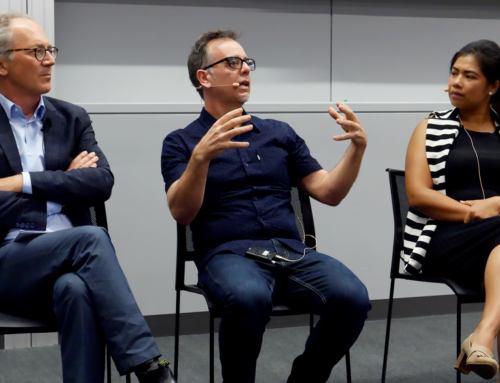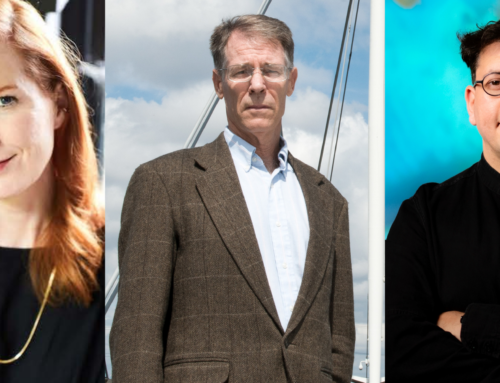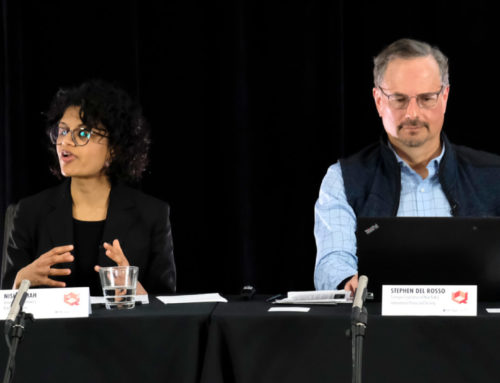After welcomes and opening remarks set the tone, Friday’s first panel took the baton from the groundbreaking research presented in Lene Hansen’s Hintze lecture on images and security the day prior and continued the discussion of new frontiers in IR. Entitled “The Q Effect: Micro-, Macro- and Metaphysical,” the panel sought to draw together different commentaries on considering a quantum turn in international security from both sides of the ontology/epistemology divide. Presentations ran from the non-metaphorical advances of quantum computing to epistemic and ethical considerations, as again a notion of complementarity took a central, if unspoken, role as a guiding principle of the conference.
Leading things off was Professor David Reilly, who oversees the wealth of Australia’s research into quantum computing in his capacity as director of the University of Sydney’s Quantum Nanoscience Institute. His relatively plainspoken explanations of highly complex research couldn’t belie Reilly’s unrivalled authority on this kind of research. Catering to his audience, he spoke less to the sense of technical details and experimental design of quantum computing but rather potential applications.

Professor David Reilly, Director of the Quantum Nanoscience Institute and physicist at the University of Sydney. (Photo: Jose Torrealba)
Reilly began by introducing the audience to Shor’s algorithm (1994), the algorithm that showed that quantum computers could factor primes exponentially faster than conventional binary computers. As a result, a quantum computer could potentially unlock contemporary methods of public-key encryption (the ubiquitous RSA), which assumes that factoring large numbers into primes is unfeasible. Given that a quantum computer could essentially provide access to secure communications from across the world, the potential cryptological benefits are obvious. While Reilly spoke of other security applications as well, including quantum graviometers capable of detecting submarines or potential applications in biology and pharmacology, he tended to stress the cryptographic applications that indeed the world’s superpowers seem most concerned with as well.
Speaking on the subject of NSA attempts to “own the net” through quantum computing revealed in the Snowden leaks, Reilly pointed out that much of the information wasn’t all that surprising. He gave a quick overview of the American government’s securitized informatics programs, all made from publicly-available information. It should be no surprise to anyone, esteemed quantum researcher or not, that the US government would pursue quantum capabilities. What did surprise Reilly, however, seemed to be that according to the leaks, the NSA efforts still seemed in such early days. With the tone thus set by a discussion of the very real impact of quantum sciences on global security, it was now time to talk implications.
Jairus Grove, an assistant professor at the University of Hawaii, took the panel from the frontiers of computer science to the frontiers of IR theory, investigating how a quantum turn could prove complementary to critical approaches like complexity theory and the “new materialism”. At the root of the issue were two issues, one ontological and one epistemic, facing the dominant understandings of the social world. Jairus characterized the ontological problem as a sense of “the end of essence and eternity,” the notion that there are only qualitative differences in the world, reflecting “rearrangements of what already exists and always will.” Such a world is logically predicated on three assumptions- that there is an origin of all things, that the question of existence has a rational answer sans contradictions, and that the world can be understood and predicted through unified, discernable principles. In outlining the epistemic problem, Grove spoke to the quantum-inclined by quoting Maxwell and Bohr’s thoughts on the limits of attempts at “objective” theorizing, with Grove citing Bohr’s performative observation that “We ourselves are both actors and spectators in the drama of existence.”
Grove’s proposition for such a world is to switch out a broken notion of causality for a sense of complementarity. With such a move, indeterminacy gives way to uncertainty, a focus on phenomena is foregone in favor of events, fixed senses of the scale of events are superseded by unpredictable phase shifts from street level to the transnational and we become Bohr’s brief candles, actors and spectators at the stage of social existence relaxing and transmuting the subject-object divide. The quantum notion of complementarity then fits in well with a program of what Grove calls radical empiricism, which emphasizes complexity over chaos and stability, creativity over random chance, and orders over order. The result can be thought of as an eco-system of overlapping open systems and heterogenous actors, punctuated by events. Summing his case for future complementarity between a quantum and ecological approach to security, Grove emphasized that “security’s ecological complexity amplifies the effects of quantum uncertainty.”

Q Effect Panel during Jairus Grove’s presentation. From L to R: Katina Michael, Parag Khanna, Jairus Grove, David Reilly. (Photo: Jose Torrealba)
Taking the panel from quantum tech and social theory to exploring a quantum world we may already inhabit, Parag Khanna, Director of the Hybrid Reality Institute, spoke about the dimensions of the changes to change that Grove theorized. Highlighting the role of global capitalism and trade in creating what he called invisible infrastructure and supply chain empires, Khanna spoke convincingly for conceiving of the world as one in which understanding the atomic-level activity of individuals as consumers, habitants, and social actors was of utmost necessity as types of units, authority, and hierarchies of power undergo transformation away from territorial nation-states.
Alluding, perhaps unwittingly, to a notion akin to quantum entanglement, Khanna presented the globalized world as one in which the increasingly unrestrained mobility of information, people, and products leads to new realities for politics and the emergence of a global consciousness through data. We see with that the existence of a quantum people- the 230 million expats worldwide affected more often by economic than political geographies. Speaking again to a complementarity of ideational and material, Khanna talked of the complexity of “personbytes,” the amount of information one person can hold and the implications of this information mobility for the world. But Khanna was careful to point out as well that quantum principles applied not only to labor, but to capital as well. He pointed to Glencore Xstrata, the world’s largest commodities trader which maintains almost no physical presence, and Accenture, the world’s leading consultancy with no fixed headquarters, as examples of “meta-national” corporations able to superposition in different traditional states simultaneously. Tying to Grove’s earlier assertion that the process of change was changing, the total effect of these shifts in the understandings of units and their properties is a potential to reshape the macro-system through the effects of the atomic micro-units of global politics.

Parag Khanna presents his research as fellow panelists Katina Michael and Jairus Grove look on. (Photo: Jose Torrealba)
Wrapping up the panel was Katina Michael, associate professor in the School of Information Systems and Technology of the University of Wollongong, who presented her work on the socio-ethico implications of what she called War and Conflict 2.0. She framed her presentation around the asymmetrical “cyber war” between the Israeli Defense Forces and Hamas’s military wing, the Al-Qassam brigades. Israel published footage of their assassination by drone-fired Hellfire missile of Al-Qassam’s leader, Ahmad Jabari, on Youtube to herald their November 2012 aerial campaign against the Gaza Strip.
As conflict opens new fronts in the cyber world, the effects of “glocalization” amplify a new set of questions seeking answers. Who are the constituents of cyber warfare? Are mind-body distinctions, similar to quantum implications for the subject-object divide, relaxed? Where does the accountability over the enforcement of “terms and services” agreements and what power dynamics can they reflect? She then presented a series of slides showing twitter metadata, produced using tweetstats.com, tracking the tweet war running concurrent to the physical war between the IDF and Al-Qassam brigades. But these kinds of questions do not just need to be answered in the contexts of wars overseas, Michael spoke as well about the coming Age of Überveillance in which ubiquitous technologies allow for seemingly omnipotent surveillance. If in a quantum understanding, observation changes the properties of the system, what are the implications of such an understanding for this imminent scenario?
Presented with practical, ethical, and theoretical implications of a quantum understanding, conference participants then picked the brains of panelists with a range of questions touching on a number of topics. Of particular note were questions raised by Charlotte Epstein, who raised genuine issues with IR as discipline’s past of scientific appropriation and emulation. Other questions pushed further into considering a concomitant quantum ethics and elucidating and highlighting the deep links between the quantum turn in physics and continental philosophy. With big questions ultimately leading to more big questions, now was perhaps as good a time as any to recall the words attributed to Richard Feynman that Reilly quoted in his presentation: “If you think you understand quantum physics, you don’t understand quantum physics.”






[…] just as last year’s lecture by Lene Hansen on images in security spoke to themes that would recur throughout the conference, McKenzie Wark’s lecture “Exit to the Planetarium” was the perfect spark for […]
[…] sundown. Panels had touched on so many facets of security studies, natural and social science, ethics, epistemology, and security aesthetics that a single closing panel would have to serve more pledge […]
[…] collection. Though Epstein registered considered skepticism about a proposed “quantum turn” during the question period at the opening Q Panel, Epstein’s focus on the role of biometrics in changing constitutions of the political subject […]
[…] Friday’s opening Q Effect panel opened the theoretical possibilities for quantum IR, the afternoon’s Geo-Security: Risky States, […]